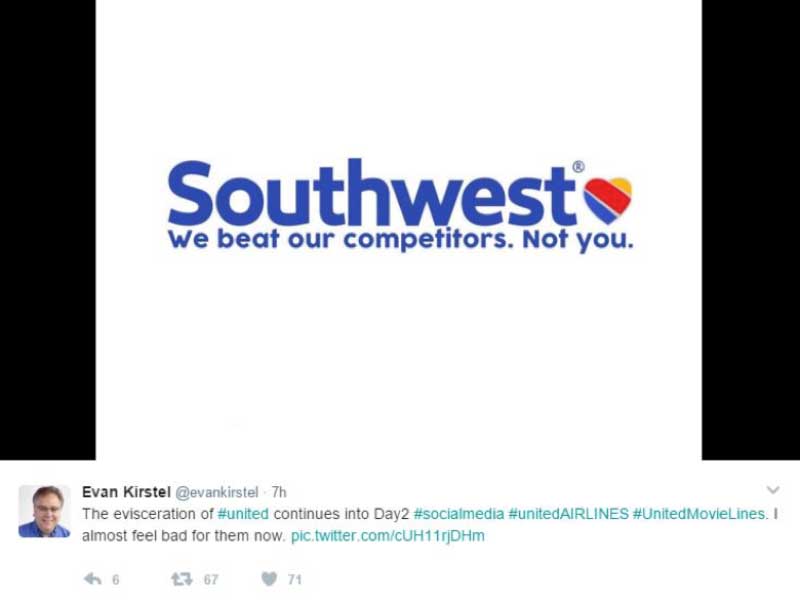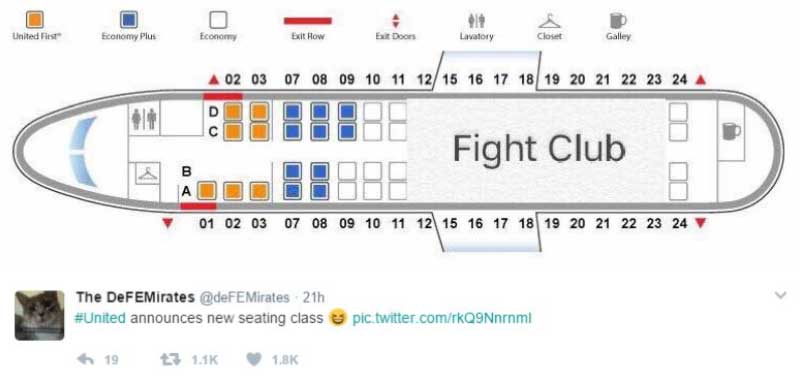United Airlines vs. Passengers: A PR Crisis
Unless you have been wandering in the woods without any cell service, you have heard about the United Airlines fiasco that went viral two days ago. The widely-viewed video is sure to have the senior execs at PepsiCo sighing with relief, now that the public spotlight has been taken off of them following their incredibly insensitive ad starring model and reality TV celeb, Kendall Jenner. What happened you ask? A situation that many argue could have been easily avoided.
A United Airlines flight bound to Louisville, KY from Chicago, IL was overbooked after the airline realized they needed four of their own crew members to board the flight to Louisville so they could be well-rested and wouldn’t miss working a flight departing Louisville the following day.
Their solution? Asking their paying passengers to volunteer to get off the plane and take another flight. United Airlines offered to compensate the volunteers $1,000.
When nobody was willing to volunteer to depart the flight, four passengers were randomly selected. One gentleman, a 69-year-old, was selected but refused to leave the plane, citing that he was needed in Louisville the next day to see patients. Due to his refusal to comply, Chicago police were brought aboard and forcibly removed the doctor from the flight, resulting in him hitting his face on a nearby seat. He was then dragged from the plane. During the chaos, multiple passengers used their cell phones to record the incident. The video can be seen above.
As United has now learned first-hand, we live in the Age of Information and brands are more vulnerable than ever before. The slightest misstep can become the next trending sensation, leading to vast criticism, even from people that fall outside of their customer-base. How do we protect our brands knowing this? Let’s look at each misstep of the United nightmare.
Customers always come first
This seems so simple and obvious, but it can require burning into your psyche; that’s the royal “your”, meaning anyone and everyone associated with the brand. Frontline employees are the most powerful piece of a brand. Sure, high-powered executives and PR specialists have enormous reach in a moment, but they never add up to the sum of the interactions of on-site worker and participants. We have to address this in two ways. The first is to really dive deep into the policies and procedures we establish for our staff.
Where are the landmines in that field of policy? The what-if’s and where they hide, and examining those early and often is the first key to avoiding the disaster. A bigger overall theme to address is empowerment. We have to make our employees feel empowered to protect our brand. That feeling of ownership inspires so much “right” in our decisions that it can be the biggest factor in our brand equity.
I don’t pretend to know what policies exist for United employees or the exact facts of the incident.
Based on the perception (which is today’s reality), there was a golden opportunity for multiple employees to own the brand in this dilemma. United stands behind the requirement of the passenger bump because the crew members needed to be in Louisville and have the required amount of rest prior to their flight the next day. However, there have been many questions if United could have looked into other flights from competing airlines to send the four employees on or rent a vehicle for the employees to have driven to Louisville themselves, seeing that it is only a four-hour drive between destinations.
The most viable option that would have appeased all parties involved would have been to simply up the compensation package for passengers volunteering to depart and take a later flight.
This is a common practice by airlines. Frequent travelers even look to take advantage of situations like this one to save them money on future trips. Unfortunately for United, their measly $1,000 was not anything to be late over.
Delta Airlines handled this situation the correct way when they offered a family an $11,000 American Express gift card to take a later flight. Now an $11,000 compensation package could be argued as an extreme and unusual circumstance, but another key difference between this and the United predicament was that bidding war occurred at the gate and not following the plane’s boarding.
The next obvious piece is the statement released by their CEO
"This is an upsetting event to all of us here at United. I apologize for having to re-accommodate these customers. Our team is moving with a sense of urgency to work with the authorities and conduct our own detailed review of what happened. We are also reaching out to this passenger to talk directly to him and further address and resolve the situation."
~ Oscar Munoz, CEO, United Airlines
How that statement was crafted and baptized to be released is beyond me. Who thought that was a good idea?
My interpretation, which seems to be fairly rampant among the masses, is that we’ve basically been told that they are sorry their policies created an unavoidable situation. Whoa. Again, perhaps it’s too obvious to all of us, save the United CEO and PR team; but the only acceptable response to something as widespread and nasty as this situation is to fall on your sword. Hard. Period. Your policies may have created the problem, but you don’t reinforce that in a mediocre attempt at an apology. You take full blame, because it’s coming anyway, and you work swiftly behind the scenes to both right the wrong and correct the policies. There may be no full means to right this wrong, but you exhaust every resource to do it.
Following the release of the videos, the Internet has shown no mercy as they’ve trolled United Airlines on social media. Late Night Show Comedians have also put in their “two cents” with Jimmy Kimmel taking the time to craft this new commercial for United.



It has been reported that United’s stocks have taken a plunge of around $250 million. After all of this, the CEO has issued another statement; it’s an improvement but could be argued as too little too late.
"Dear Team, The truly horrific event that occurred on this flight has elicited many responses from all of us: outrage, anger, disappointment. I share all of those sentiments, and one above all: my deepest apologies for what happened. Like you, I continue to be disturbed by what happened on this flight and I deeply apologize to the customer forcibly removed and to all the customers aboard. No one should ever be mistreated this way. I want you to know that we take full responsibility and we will work to make it right. It's never too late to do the right thing. I have committed to our customers and our employees that we are going to fix what's broken so this never happens again. This will include a thorough review of crew movement, our policies for incentivizing volunteers in these situations, how we handle oversold situations and an examination of how we partner with airport authorities and local law enforcement. We'll communicate the results of our review by April 30th. I promise you we will do better.
Sincerely, Oscar."
A brand is defined as the feelings customers have about our entities when they hear their name.
Oversimplified perhaps, but that’s the short version. An incident of this magnitude has catastrophic effects on a brand. Immediate reaction and full scale attempted resolution are the only ways to try and heal those wounds. As United stands today, their front line dug a huge hole to climb out of, and their leadership somehow made the decision to dig it a little deeper.
Is United too big to fail? Maybe. Has their brand suffered damage to the point that it’s impossible to recover completely? I think so. What will the long-term effects be? That is still pending. Their next steps (or missteps) and time will be the only way to tell. Until then, stay tuned.
